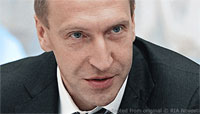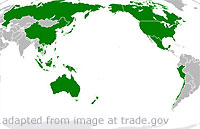Shuvalov calls for Russia to look east
Russia needs to realize the untapped potential of its proximity to Asia, the deputy prime minister says
Natasha Doff - Moscow News - themoscownews.com - 8.29.12 - JRL 2012-156
First Deputy Prime Minister Igor Shuvalov called on Russia on Tuesday to shift a large chunk of its trade and economic focus east in order to make the most of the growing Asian economies in the face of a second bout of recession in Europe.

file photoSpeaking ahead of the Asia-Pacific Economic Cooperation summit, which Russia will host for the first time next week in the Far East city of Vladivostok, Shuvalov said the country needed to realize the potential of its proximity to Asia.
"Russia is a European country, but there is a need to shift the balance eastward," Shuvalov said at a news conference. "This doesn't make the West less important, it just means there needs to be a change in mentality to make Russians look east a bit more."
 Shuvalov, who heads the organizing committee for Russia's yearlong APEC chairmanship, said that Russia was aiming for at least 50 percent of its foreign trade to come from the Asia-Pacific region. Currently, fewer than a quarter of Russian exports go to the 21 countries in the region, compared to 50 percent to slowing European economies, Reuters reported, citing trade figures for the first half of 2012.
Shuvalov, who heads the organizing committee for Russia's yearlong APEC chairmanship, said that Russia was aiming for at least 50 percent of its foreign trade to come from the Asia-Pacific region. Currently, fewer than a quarter of Russian exports go to the 21 countries in the region, compared to 50 percent to slowing European economies, Reuters reported, citing trade figures for the first half of 2012.
"If we set ourselves the task of diversifying our economy, reducing our resource dependency and being much more valuable to different economies, then the balance of our trade must change," Shuvalov said. "We need to have one foot in Europe and one in Asia."
Speaking at the same meeting, Gennady Ovechko, Russia's senior APEC official, said economies in the region are growing around 30 percent faster than elsewhere.
Far East development
Russia chose to hold the summit in Vladivostok in order to show the importance of the Asia-Pacific region to Russia and demonstrate that it is capable of developing its long-abandoned Far East territory, Shuvalov said.
The nearly $20 billion project to develop the Pacific port city seven time zones away from Moscow was nearly scrapped during the 2008-09 financial crisis in favor of a cheaper option to hold it in St. Petersburg, but managed to escape the cut.
Since then, the run-down regional backwater of just over half a million has been transformed into what Shuvalov describes as "Russia's investment capital," with new infrastructure, sewage works and over 50 new venues. The world's longest cable-stayed bridge was also constructed from the city to Russky Island, where most of the summit meetings will be held on Sept. 7-8, including a keynote address from President Vladimir Putin.
The heads of state of several major world economies, including China and Mexico, will be present at the summit, along with the heads of big global companies operating in the region. U.S. President Barack Obama turned down his invitation due to the summit's proximity to the country's elections, and will send Secretary of State Hilary Clinton in his stead.
Legacy?
The APEC project has attracted criticism for failing to cater for residents in the city in the long term. Artyom Lukin, an associate professor at the city's Far Eastern Federal University told The Moscow News earlier this month that the project has not helped solve problems like the poor quality of housing or the drain of educated professionals to Moscow, and that many of the venue buildings will likely turn into white elephants.
However, Shuvalov dismissed these concerns, saying that the city would be able to use the new facilities, including a state-of-the-art university complex on Russky Island, after the summit ends.
"Of course, Vladivostok will need to find its own way forward, but the new infrastructure will help it attract investment and develop its business climate," the minister said.
He said that the authorities would like to invest as much in reviving other major regional cities, but fears of a second wave of financial crisis meant it was too risky to allocate funds for such projects from the federal budget.
Keywords: Russia, Economy, Business, Investment - Russia, Far East, China, Japan, Koreas - Russian News - Russia - Johnson's Russia List
First Deputy Prime Minister Igor Shuvalov called on Russia on Tuesday to shift a large chunk of its trade and economic focus east in order to make the most of the growing Asian economies in the face of a second bout of recession in Europe.

file photoSpeaking ahead of the Asia-Pacific Economic Cooperation summit, which Russia will host for the first time next week in the Far East city of Vladivostok, Shuvalov said the country needed to realize the potential of its proximity to Asia.
"Russia is a European country, but there is a need to shift the balance eastward," Shuvalov said at a news conference. "This doesn't make the West less important, it just means there needs to be a change in mentality to make Russians look east a bit more."
 Shuvalov, who heads the organizing committee for Russia's yearlong APEC chairmanship, said that Russia was aiming for at least 50 percent of its foreign trade to come from the Asia-Pacific region. Currently, fewer than a quarter of Russian exports go to the 21 countries in the region, compared to 50 percent to slowing European economies, Reuters reported, citing trade figures for the first half of 2012.
Shuvalov, who heads the organizing committee for Russia's yearlong APEC chairmanship, said that Russia was aiming for at least 50 percent of its foreign trade to come from the Asia-Pacific region. Currently, fewer than a quarter of Russian exports go to the 21 countries in the region, compared to 50 percent to slowing European economies, Reuters reported, citing trade figures for the first half of 2012.
"If we set ourselves the task of diversifying our economy, reducing our resource dependency and being much more valuable to different economies, then the balance of our trade must change," Shuvalov said. "We need to have one foot in Europe and one in Asia."
Speaking at the same meeting, Gennady Ovechko, Russia's senior APEC official, said economies in the region are growing around 30 percent faster than elsewhere.
Far East development
Russia chose to hold the summit in Vladivostok in order to show the importance of the Asia-Pacific region to Russia and demonstrate that it is capable of developing its long-abandoned Far East territory, Shuvalov said.
The nearly $20 billion project to develop the Pacific port city seven time zones away from Moscow was nearly scrapped during the 2008-09 financial crisis in favor of a cheaper option to hold it in St. Petersburg, but managed to escape the cut.
Since then, the run-down regional backwater of just over half a million has been transformed into what Shuvalov describes as "Russia's investment capital," with new infrastructure, sewage works and over 50 new venues. The world's longest cable-stayed bridge was also constructed from the city to Russky Island, where most of the summit meetings will be held on Sept. 7-8, including a keynote address from President Vladimir Putin.
The heads of state of several major world economies, including China and Mexico, will be present at the summit, along with the heads of big global companies operating in the region. U.S. President Barack Obama turned down his invitation due to the summit's proximity to the country's elections, and will send Secretary of State Hilary Clinton in his stead.
Legacy?
The APEC project has attracted criticism for failing to cater for residents in the city in the long term. Artyom Lukin, an associate professor at the city's Far Eastern Federal University told The Moscow News earlier this month that the project has not helped solve problems like the poor quality of housing or the drain of educated professionals to Moscow, and that many of the venue buildings will likely turn into white elephants.
However, Shuvalov dismissed these concerns, saying that the city would be able to use the new facilities, including a state-of-the-art university complex on Russky Island, after the summit ends.
"Of course, Vladivostok will need to find its own way forward, but the new infrastructure will help it attract investment and develop its business climate," the minister said.
He said that the authorities would like to invest as much in reviving other major regional cities, but fears of a second wave of financial crisis meant it was too risky to allocate funds for such projects from the federal budget.